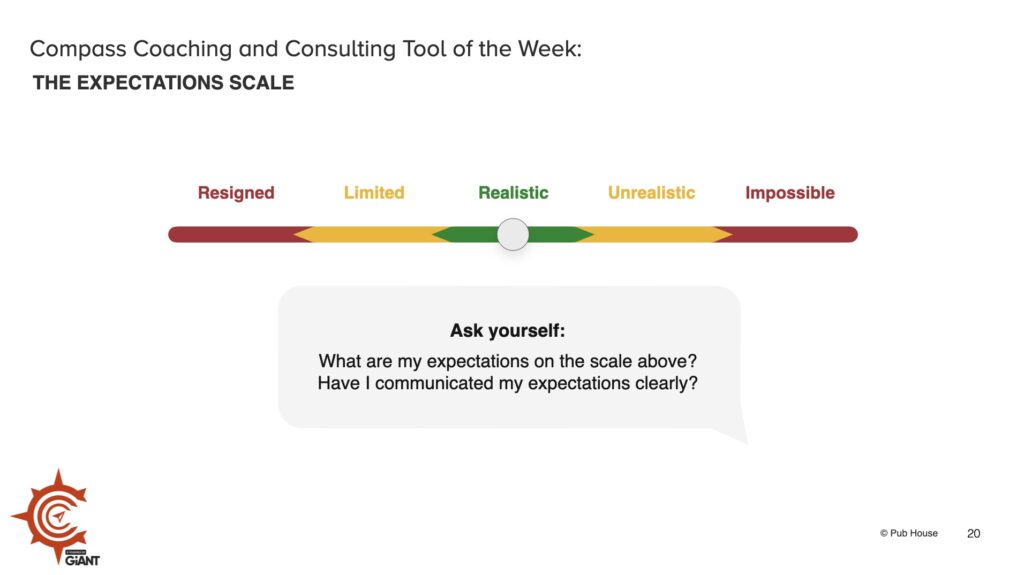
The Expectations Scale
Leaders, and indeed anyone in a position of influence, face two primary challenges regarding expectations. The first challenge is ensuring that expectations are clearly and effectively communicated. The second, which is the focus of the Expectations Scale, is determining whether these expectations are realistic.
Understanding the Expectations Scale
The Expectations Scale is a tool designed to help individuals evaluate their expectations. It categorizes expectations into five levels: at the upper end are impossible and unrealistic expectations, and at the lower end are limited and resigned expectations. Realistic expectations are ideally positioned between these extremes.
For example, you might experience frustration if an employee or a family member fails to meet your expectations. This situation often necessitates reflection and a possible adjustment of your expectations.
The Importance of Realistic Expectations
One of the key competencies in leadership is setting realistic expectations, which begins with having realistic expectations of oneself. People’s self-expectations can vary greatly; some are overly lenient, while others are excessively stringent. It’s common to start with high, sometimes unattainable expectations for ourselves and those we lead, or conversely, to set them too low.
As we mature and become more effective in our relationships, and more aware of our own and others’ capabilities, we start to evaluate our expectations in terms of what is realistic concerning performance, behavior, and growth.
The Expectations Scale not only aids in the maturation of our expectations but also encourages reflection on the healthiness of these expectations. We then incorporate this awareness into our leadership.
The Dynamics of Expectation Management
Setting realistic expectations is crucial, but it’s equally important to avoid setting them too low. Interestingly, expectations often become limited because they were unrealistic to begin with. Without a healthy evaluation of our expectations of someone, in our frustration we might bypass realistic expectations entirely, moving straight to limited or resigned expectations.
When our expectations become too limited, we may start doubting the capabilities of others, leading to resigned expectations where we believe that success is unattainable. This often indicates a failure in leadership on our part.
However, realistic expectations should still challenge individuals to grow. Expectations should be adjusted based on an individual’s development stage, skills, and personal and professional growth.
Continuous Adjustment of Expectations
The Expectations Scale serves as a visual tool and a reflective mirror, continually asking us to evaluate how realistic our expectations are. It prompts important questions:
- What type of expectations am I setting for myself? Are they realistic?
- How am I communicating expectations to others? Are they appropriately challenging yet achievable?
Using the Expectations Scale to engage in open dialogue about expectations with those you lead can provide valuable insights. Asking them how they perceive your expectations can foster a supportive environment conducive to mutual growth.
Inviting Feedback and Negotiating Expectations
It’s beneficial to invite honest feedback without judgment. Asking others what they consider to be realistic expectations can open up negotiations that lead to more tailored and effective outcomes. This process is more of an art than a science, requiring nuanced understanding and adaptation.
Conclusion
By effectively using the Expectations Scale and engaging in open discussions about expectations, leaders can enhance their effectiveness and support their teams in achieving greater success. This approach not only improves leadership but also empowers individuals to reach their full potential.
By integrating these principles and continuously adapting to the evolving capabilities of those we lead, we can maintain a balanced and productive environment that fosters growth and satisfaction.
References
- John Maxwell on leadership and expectations in The 21 Irrefutable Laws of Leadership.
- Daniel Goleman on emotional intelligence and its impact on realistic expectations in Emotional Intelligence: Why It Can Matter More Than IQ.
